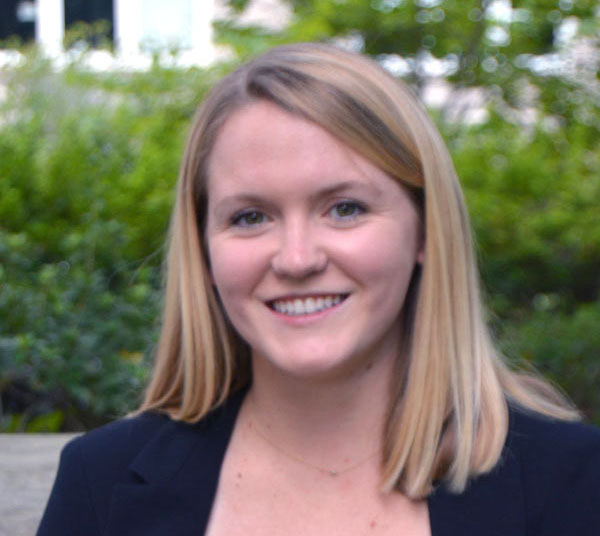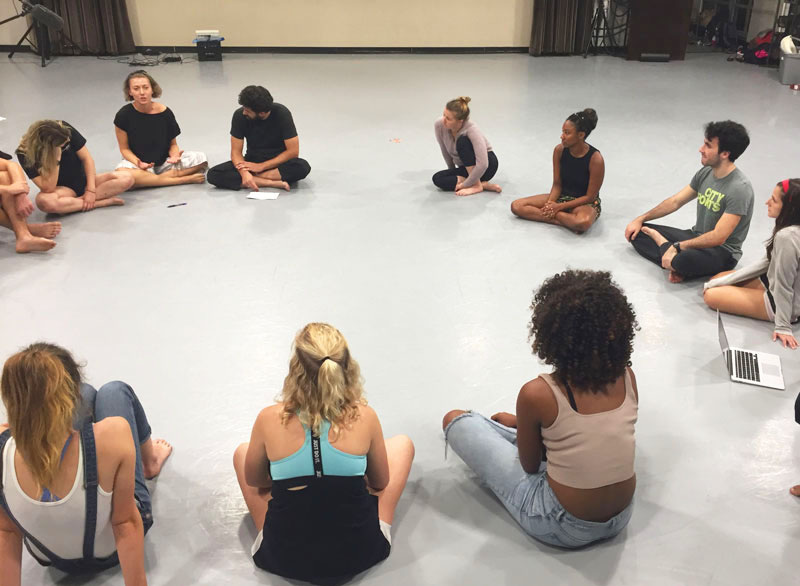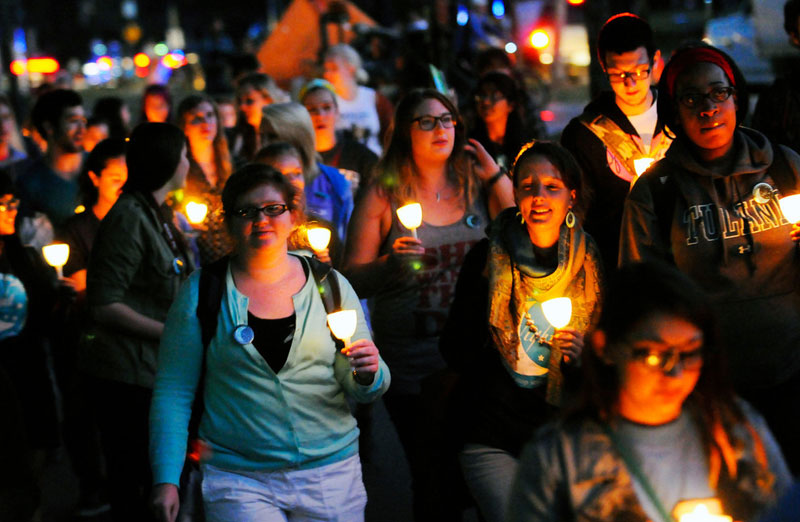A Message from the Provost

The Tulane community has been engaged in a robust dialogue about sexual violence issues. This conversation is critical. For us to change a culture that has allowed sexual violence to flourish, we need to be armed with information that helps us create a community rooted in values of mutual respect, understanding, and care.
To that end, we are initiating a monthly newsletter on sexual violence issues. We will share scholarship and news that shine a light on these problems and point towards solutions. We will also spotlight the work being done by individual community members and through campus programs and initiatives. In this first edition of our newsletter series we will will provide a general overview of issues related to sexual assault.
I hope that these newsletters are a helpful tool in our commitment to stopping all sexual violence—and moreover, that you find them meaningful in your own personal work to better Tulane for yourself and those around you.
Robin Forman, PhD
Senior Vice President for Academic Affairs and Provost
All In Update
This summer, university leaders in our Title IX and Public Health offices came together to propose new initiatives aimed at sexual violence prevention. The proposal was informed by insights learned through last year’s climate survey, recommendations from a panel of national experts and input from students, faculty and staff. Since the programming was approved this summer, we’ve made a significant amount of progress. You can view the entire plan on the new All In website.
This e-newsletter is one of many ways that we’re working to better engage and inform the Tulane community in a collaborative effort to prevent sexual violence on campus.
Progress Updates:
We are hiring the following positions that were identified as critical needs in addressing culture challenges and supporting prevention initiatives. These include:
- Assistant Director for Fraternity Life in the Office of Greek Life to focus on men's education and engagement within the Greek system
- Senior Health Promotion Specialist focused on sexual violence prevention and education for Tulane’s graduate and professional students
- LGBTQ+ Graduate Assistant to address the needs and concerns of this community on campus
New groups have been convened to continue community engagement and input to drive future programming. These include:
- A coalition of student leaders who meet regularly to discuss, plan and coordinate student-led sexual violence prevention and response efforts
- A coalition of university leaders, including faculty, staff and students focused on coordination of sexual violence prevention, response and community engagement
Outreach efforts and tools have been put in place to coordinate communications and to provide more engagement and educational opportunities for students, parents, faculty and staff. These include:
- The All In website, a centralized, hub for sexual violence prevention and response, support and resources
- The social media launch of the “Know Your Power” sexual violence prevention campaign.
We are also currently engaged in identifying additional key efforts in the following areas:
- LGBTQ+ communities
- Research to support students of color
The above is just a sampling of the key activities underway. At the end of each semester, a more comprehensive report will be shared online.
Sadly, there’s no clear, single solution to stopping sexual violence. Our own data proved that the nation’s “best-practices” were not enough. In addition to the efforts mentioned above, our drive to end sexual violence includes supporting new research in this area, engaging local and national experts and becoming the country’s leader in the field of sexual violence prevention. At every level of the university, we are deeply committed to finding solutions to prevent sexual violence and to respond to survivors with care, compassion and support.
At Tulane, we are ALL involved. We are ALL instrumental. And we are ALL IN to stop sexual violence in our community.
Erin Blake, USG President, shares why the issue of sexual violence at Tulane is important to her

After the jarring results of the Climate Survey were released last January, the eyes of the Tulane community, including my own, were forever opened to an epidemic that sweeps our campus. Leaving the Town Hall after the release and going home to make dinner, prep for the next day of classes, get ready for bed, all felt so daunting but at the same time hilarious, like everything in our community would just go back to normal once everyone woke up the next morning. That was the scariest thought for me after the release — that people wouldn't listen and would stop caring. It was obvious that rape culture was something that permeated our campus, that violence was an infection that spread through our culture. So, waking up the next morning, it became even more clear that being quiet, silencing entire communities who were affected, and just thinking about the problem were things that had to end. Time is up, and we have to start acting.
Sexual violence prevention was one of the biggest factors in why I ran for my position as President of the Undergraduate Student Government (USG). I believe that our organization has a responsibility to work directly with the administration to ensure our students have the most fulfilling student experience possible during their time at Tulane, without having to worry about whether their safety is a priority to their administration. This can’t just be true for the majority of our students either, but is even more pertinent for our marginalized students, especially our students of color and LGBTQ+ students. One of the most inspiring things I’ve seen in my time at Tulane is how involved and passionate our students are, and how much heart they put in to the things they care about. Whether that is writing about Health and Wellness for a student run magazine, or engaging in an engineering club that brings clean water to communities, the fear of violence should not be yet another thing our students have to stress about during their academic career. It’s our job as student representatives to communicate with and challenge our administration to keep students’ safety and best interests at the forefront of everything they do, from decisions on housing and residence life to mental health resources, and acknowledge that all of these decisions contribute to the prevention of sexual violence on our campus.
Caring about student representation and safety can’t be the only reason for activism in sexual violence prevention, we have to fight for the human rights of our students. Acknowledging how many students on our campus are survivors, publicly or not, has to be in the focus of all of the work that we do around this issue. It is up to our community, BOTH our administration and our students, to change our campus culture, but we have to maintain the humanity of our students through the entire process. This extends past the prevention of sexual violence, but in to our response to sexual violence as we work to change this culture. It is a duty we have to our students because, like Meredith Smith, our Title IX Coordinator, stated at Shifting the Paradigm, every one of these numbers has a face behind it. So, I work to stop sexual violence on this campus because we can’t rest on what we’ve done so far — the time to act is now, and everyone is watching to see it happen.
Shifting the Paradigm
Tulane's annual event to share Title IX reporting took place on Tuesday, October 9. The event slides include data on sexual misconduct cases at Tulane for the 2017-18 academic year.
Log in and view the Shifting the Paradigm event slides
A Call for Diversity and Inclusion in Sexual Violence Prevention
Tulane’s Sexual Misconduct Climate survey conducted in Spring semester of 2017 revealed that LGBTQ+ students are experiencing high rates of sexual violence and harassment on campus, but there is more research to be done on how all sexual violence, among other forms of harm, safety, and health issues, are uniquely impacting these communities.
In 2017, the Tyler Clementi Center at Rutgers University partnered with several research institutions on a study of queer-spectrum and trans-spectrum* student experiences in higher education. Analyzing a sample of over 70,000 queer-spectrum and trans-spectrum students attending 918 four-year colleges and universities throughout the United States, this study compiled the largest data set of these populations to date from seven national surveys. Among the selected surveys are the National Survey of Student Engagement (2017), the American College Health Association-National College Health Assessment (2016), and The Freshman Survey (2016), all three of which Tulane participates in and implements as a member of the Association of American Universities (AAU).
Published in August 2018, A Meta-analysis of Queer-Spectrum and Trans-Spectrum Student Experiences at US Research Universities: Opportunities for Diversity and Inclusion1 provides a glimpse into the campus climate for LGBTQ+ college students by highlighting critical health and academic outcome indicators and disparities. One of the surveys included in the study, the American College Health Association-National College Health Assessment (ACHA-NCHA), asks students questions about mental health, substance use, sexual victimization, relationship violence, and academic impediments experienced within 12 months prior to taking the survey. Overall findings revealed that queer-spectrum and trans-spectrum students experience adverse health and safety outcomes at higher rates than their heterosexual and non-transgender peers. These outcomes include but are not limited to: feeling less safe on campus, experiencing discrimination, receiving verbal threats, taking a leave of absence from the university, feelings of isolation or loneliness, depression, inflicting self-harm, suicidal ideation, as well as higher rates of alcohol, tobacco, and other drug use. In addition, queer-spectrum and trans-spectrum students reported higher rates of sexual victimization and relationship violence compared to straight and cis-gender students.
To learn more about the study findings and read the entire White Paper.
Recognizing the intersections and impact of mental health, discrimination, harassment, substance use, and violence on student well-being and academic success, this study depicts an important message about campus climate for LGBTQ+ students that calls for comprehensive, socio-ecologically based solutions for public health challenges like sexual violence. Tulane’s sexual violence prevention plan includes further research with LGBTQ+ students to better understand how sexual violence impacts these communities and how Tulane can better support them.
*The terms “queer-spectrum” and “trans-spectrum” are used to be inclusive of all sexual and gender minority identities.1
References
1. Greathouse, Maren & Brckalorenz, Allison & Hoban, Mary & Huesman, Ronald & Rankin, Susan & Bara Stolzenberg, Ellen. (2018). A Meta-analysis of Queer-Spectrum and Trans-Spectrum Student Experiences at US Research Universities: Opportunities for Diversity and Inclusion. 49-75. 10.1007/978-3-319-94836-2_3.
Faculty Spotlight: Jenny Mercein
In each issue, we will feature the scholarship and leadership of one of the many Tulane faculty members working on issues of sexual violence.

Jenny Mercein, Assistant Professor of Theatre and Dance, watched the live stream of the January town hall where the climate survey results were released and found herself inspired “to hear students speaking so passionately and from the heart. And I thought there is so much energy and so many people here who want change, how can I be a part of facilitating that change?” It immediately reminded her of theatre performances that have tackled complicated issues — like football and head injuries — that were a catalyst for conversation. “It seems like students need venues where they can talk, and through these conversations we can create change.”
Partnering with local theatre company Goat in the Road, Mercein wanted to create that kind of thought- and conversation-provoking theatre experience for Tulane on the issue of sexual assault. She applied for and received a Lavin-Bernick Grant as well as additional support and funding from Newcomb College Institute and All In: Tulane’s Commitment to Stop All Sexual Violence initiatives. She also developed an additional partnership with Katie Matthews, a documentary filmmaker who was an instructor with the Project IX class, to film the process of creating the performance piece.
But to make a piece about the student experience, Mercein needed students. Along with her Department of Theatre and Dance colleague — and Goat in the Road member — Darcy Fulcher, as well as students, they recruited a diverse group of 11 students (7 women, 4 men) to participate in the piece, now called Roleplay. The students come together every few months in intensive sessions to birth the material. The first session was a few weeks ago in September, where they held rehearsals over several weeknights. According to Mercein, the students engaged in “tons of improv, writing exercises, all sorts of exercises meant to generate raw material—it was all coming from the student voices.”
Through the workshop, they widened the scope of the piece to be about more than sexual assault, looking at love, sex, relationships — and the fun parts about love and dating and sex, before going under the surface to the more concerning elements. Mercein hopes that the finished product says, “Look at Tulane attacking this head on in a really creative, interesting way, and look at how open these students are to make a dent with creativity.”
The students will come together again next month and then again in February. During the spring semester, Mercein, Fulcher, and their colleagues from Goat in the Road will synthesize the student material into a script—with student input—which will be performed in April in a staged reading for the community. What’s essential is that the piece reflects our actual students. Since all of the material is coming from the ensemble, Mercein hopes their fellow students can say, “Our peers wrote this, our peers generated this material.”
From the community collaboration, fellow faculty leadership, the student participation, and the institutional support, Mercein’s spearheaded a project that is incredibly reflective of Tulane. However, the goal is to create not just something that speaks to the Tulane experience but to all campus sexual violence as well. With the documentary that Matthews is making of the creation of Roleplay with a curriculum guide detailing this process, there is a hope that other universities can follow Tulane’s lead to create works of their own. But to duplicate what Mercein has created, it will take the same support and enthusiasm that she said she has felt from everyone involved, including the institutional support. Or to put it another way, “This sense of all in.”
Come back next month for a another Faculty Spotlight as well as a feature on the Violence Prevention Institute!
What We're Reading: Not That Bad: Dispatches from Rape Culture, Edited by Roxane Gay
In this valuable and revealing anthology, cultural critic and bestselling author Roxane Gay collects original and previously published pieces that address what it means to live in a world where women have to measure the harassment, violence, and aggression they face, and where they are “routinely second-guessed, blown off, discredited, denigrated, besmirched, belittled, patronized, mocked, shamed, gaslit, insulted, bullied” for speaking out. Contributions include essays from established and up-and-coming writers, performers, and critics, including actors Ally Sheedy and Gabrielle Union and writers Amy Jo Burns, Lyz Lenz, and Claire Schwartz. Covering a wide range of topics and experiences, from an exploration of the rape epidemic embedded in the refugee crisis to first-person accounts of child molestation, this collection is often deeply personal and is always unflinchingly honest. Like Rebecca Solnit’s Men Explain Things to Me, Not That Bad will resonate with every reader, saying “something in totality that we cannot say alone.”
Searing and heartbreakingly candid, this provocative collection both reflects the world we live in and offers a call to arms insisting that “not that bad” must no longer be good enough.
Other Reads and Resources
Campus Sexual Assault: A Systematic Review of Prevalence Research From 2000 to 2015 by Lisa Fedina, Jennifer Lynne Holmes, and Bethany L. Backes
A recent article in the journal Trauma, Violence, & Abuse examines prevalence studies of campus sexual assault from a recent 15-year period, highlighting the range of rates found and methodologies used. Read More >>
Why Women Can Take Years to Come Forward With Sexual Assault Allegations by Shaila Dewan and Almost No One Is Falsely Accused of Rape by Katie Heaney
The sexual assault accusations against Supreme Court nominee Brett Kavanaugh sparked The New York Times to talk with experts about the reasons why many victims of sexual assault delay reporting (Read More >>) and The Cut to look at what we know about false reporting of sexual violence (Read More >>).
Doing research about sexual violence?
Check out this guide created by Howard-Tilton Memorial Library to help students searching for information about sexual violence: Sexual Violence Prevention Resources: A Guide.
Featured Events
Take Back the Night
Wednesday, October 24; 6 p.m.
The annual event supports survivors of sexual and gender violence, including sexual assault, dating/domestic violence, and stalking.
Annual USG Town Hall on Sexual Violence
Monday, November 26; 6:00 p.m.
USG is sponsoring an interactive event for students to learn more about the All In prevention goals initiatives as well as the various resources at Tulane.
Events
Ugly Histories: What Literary Study Can Teach Us About the History of Sexual Violence in America
Monday, October 22; 6:00 p.m.
Roll Red Roll documentary screening at New Orleans Film Festival
Tuesday, October 23; 8:15 p.m.
2nd Survivor Story Showcase for Domestic Violence Awareness
Sunday, October 28; 6:00 p.m.
Audrie and Daisy Film Screening
Thursday, November 1; 9 p.m.
